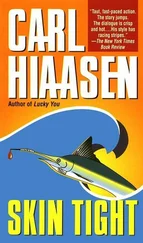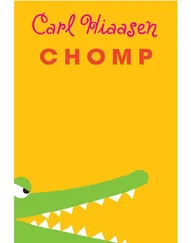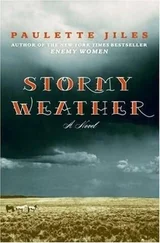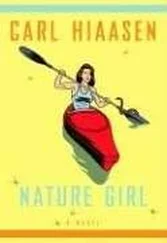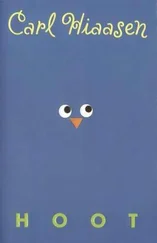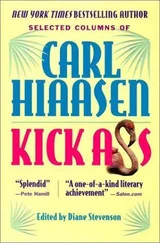Carl Hiassen - Stormy Weather
Здесь есть возможность читать онлайн «Carl Hiassen - Stormy Weather» весь текст электронной книги совершенно бесплатно (целиком полную версию без сокращений). В некоторых случаях можно слушать аудио, скачать через торрент в формате fb2 и присутствует краткое содержание. Жанр: thriller_mystery, на английском языке. Описание произведения, (предисловие) а так же отзывы посетителей доступны на портале библиотеки ЛибКат.
- Название:Stormy Weather
- Автор:
- Жанр:
- Год:неизвестен
- ISBN:нет данных
- Рейтинг книги:5 / 5. Голосов: 1
-
Избранное:Добавить в избранное
- Отзывы:
-
Ваша оценка:
- 100
- 1
- 2
- 3
- 4
- 5
Stormy Weather: краткое содержание, описание и аннотация
Предлагаем к чтению аннотацию, описание, краткое содержание или предисловие (зависит от того, что написал сам автор книги «Stormy Weather»). Если вы не нашли необходимую информацию о книге — напишите в комментариях, мы постараемся отыскать её.
Stormy Weather — читать онлайн бесплатно полную книгу (весь текст) целиком
Ниже представлен текст книги, разбитый по страницам. Система сохранения места последней прочитанной страницы, позволяет с удобством читать онлайн бесплатно книгу «Stormy Weather», без необходимости каждый раз заново искать на чём Вы остановились. Поставьте закладку, и сможете в любой момент перейти на страницу, на которой закончили чтение.
Интервал:
Закладка:
After Augustine grew up, he saw less and less of his busy uncle. Progress conspired against Felix; development swept westward, and zoning regulations forced him to move his operation repeatedly. Nobody, it seemed, wished to build elementary schools or shopping malls within walking distance of caged jungle cats and wild cobras. The last time Felix Mojack was forced to relocate his animals, Augustine gave him ten thousand dollars for the move.
At the time of Felix's death, the farm inventory listed one male African lion, three cougars, a gelded Cape buffalo, two Kodiak bears, ninety-seven parrots and macaws, eight Nile crocodiles, forty-two turtles, seven hundred assorted lizards, ninety-three snakes (venomous and nonvenomous) and eighty-eight rhesus monkeys.
The animals were kept on a nine-acre spread off Krome Avenue, not far from the federal prison. The day after the funeral, Augustine drove out to the place alone. He had a feeling that his uncle ran a loose operation, and a tour of the facility corroborated his suspicion. The fencing was buckled and rusty, the cages needed new hinges, and the concrete reptile pits hadn't been drained and cleaned in months. In the tar-paper shed that Felix had used for an office, Augustine found paperwork confirming his uncle's low regard for U.S. Customs regulations.
It came as no surprise that Felix had been a smuggler; rather, Augustine was grateful that his uncle's choice of contraband had been exotic birds and snakes, and not something else. Wildlife, however, presented its own unique challenges. While bales of marijuana required no feeding, bears and cougars did. Lean and hungry was a mild description of the illegal menagerie; Augustine was appalled by the condition of some of the animals and presumed their deterioration was a result of his uncle's recent financial troubles. Fortunately, the two young Mexicans who worked for Felix Mojack graciously agreed to help out for a few days after his death. They stocked the freezers with raw meat for the large carnivores, bought boxloads of feed for the parrots and monkeys, and restocked on white mice and insects for the reptiles.
Meanwhile Augustine scrambled to locate a buyer for the animals, somebody qualified to take good care of them. Augustine was so preoccupied with the task that he didn't pay enough attention to news reports of a tropical storm intensifying in the Caribbean. Even when it bloomed into a hurricane, and Augustine saw the weather bulletin on television, he assumed it would do what most storms did in late summer-veer north, away from South Florida, on the prevailing Atlantic steering currents.
Once it became clear that the hurricane would strike southern Dade County with a direct hit, Augustine had little time to act. He was grimly aware what sustained one-hundred-mile-per-hour winds would do to his dead uncle's shabby farm. He spent the morning and afternoon on the telephone, trying to find a secure location for the animals. Interest invariably dropped off at the mention of a Cape buffalo. At dusk Augustine drove out to fasten tarps and tie-downs on the cages and pens. Sensing the advancing storm, the bears and big cats paced nervously, growling in agitation. The parrots were in a panic; the frenetic squawking attracted several large hawks to the nearby pines. Augustine stayed two hours and decided it was hopeless. He sent the Mexicans home and drove to a nearby Red Cross shelter to wait out the storm.
When he returned at dawn, the place was destroyed. The fencing was strewn like holiday tinsel across the property. The corrugated roofing had been peeled off the compound like a sardine tin. Except for a dozen befuddled turtles, all his uncle's wild animals had escaped into the scrub and marsh and, inevitably, the Miami suburbs. As soon as phone service was restored, Augustine notified the police what had happened. The dispatcher laconically estimated it would be five or six days before an officer could be spared, because everybody was working double shifts after the hurricane. When Augustine asked how far a Gaboon viper could travel in five or six days, the dispatcher said she'd try to send somebody out there sooner.
Augustine couldn't just sit and wait. The radio said a troop of storm-addled monkeys had invaded a residential subdivision off Quail Roost Drive, only miles from the farm. Augustine immediately loaded the truck with his uncle's dart rifle, two long-handled nooses, a loaded .38 Special, and a five-pound bag of soggy monkey chow.
He didn't know what else to do.
Canvassing the neighborhood in search of her husband, Bonnie Lamb encountered the dull-eyed boy with the broken bicycle. His description of the tourist jerk with the video camera fit Max too well.
"He ran after the monkey," the boy said.
Bonnie Lamb said, "What monkey?"
The boy explained. Bonnie assessed the information calmly. "Which way did they go?" The boy pointed. Bonnie thanked him and offered to help pry his bicycle off the tree. The boy turned away, so she walked on.
Bonnie was puzzled by the monkey story, but most of the questions clouding her mind concerned Max Lamb's character. How could a man wander off and forget about his new wife? Why was he so fascinated with the hurricane ruins? How could he so cruelly intrude on the suffering of those who lived here?
During two years of courtship, Max had never seemed insensitive. At times he could be immature and self-centered, but Bonnie had never known a man who wasn't. In general, Max was a responsible and attentive person; more than just a hard worker, an achiever. Bonnie appreciated that, as her two previous boyfriends had taken a casual approach to the concept of full-time employment. Max impressed her with his seriousness and commitment, his buoyant determination to attain professional success and financial security. At thirty, Bonnie was at a point in life where she liked the prospect of security; she was tired of worrying about money, and about men who had none. Beyond that, she truly found Max Lamb attractive. He wasn't exceptionally handsome or romantic, but he was sincere-boyishly, completely, relentlessly sincere. His earnestness, even in bed, was endearing. This was a man Bonnie thought she could trust.
Until today, when he started acting like a creep.
The predawn expedition to Miami seemed, at first, a honeymoon lark-Max's way of showing his bride that he could be as wild and impulsive as her old boyfriends. Against her best instincts, Bonnie played along. She felt sure that seeing the hurricane's terrible destruction would end Max's documentary ambitions, that he'd put down the camera and join the volunteer relief workers, who were arriving by the busload.
But he didn't. He kept taping, becoming more and more excited, until Bonnie Lamb could no longer bear it. When he asked her to operate the camera while he posed on an overturned station wagon, Bonnie nearly slugged him. She quit tagging after Max because she didn't want to be seen with him. Her own husband.
In one gutted house she spotted an old woman, her mother's age, stepping through splintered bedroom furniture. The woman was calling the name of a pet kitten, which had disappeared in the storm. Bonnie Lamb offered to help search. The cat didn't turn up, but Bonnie did find the old woman's wedding album, beneath a shattered mirror. Bonnie cleared the broken glass and retrieved the album, damp but not ruined. Bonnie opened it to the date of inscription: December 11, 1949. When the old woman saw the album, she broke down in Bonnie's arms. With a twinge of shame, Bonnie glanced around to make sure that Max wasn't secretly filming them. Then she began to cry, too.
Later, resolved to confront her husband, Bonnie Lamb went to find him. If he refused to put away that stupid camera, she would demand the keys to the rental car. It promised to be the first hard test of the new marriage.
Читать дальшеИнтервал:
Закладка:
Похожие книги на «Stormy Weather»
Представляем Вашему вниманию похожие книги на «Stormy Weather» списком для выбора. Мы отобрали схожую по названию и смыслу литературу в надежде предоставить читателям больше вариантов отыскать новые, интересные, ещё непрочитанные произведения.
Обсуждение, отзывы о книге «Stormy Weather» и просто собственные мнения читателей. Оставьте ваши комментарии, напишите, что Вы думаете о произведении, его смысле или главных героях. Укажите что конкретно понравилось, а что нет, и почему Вы так считаете.

